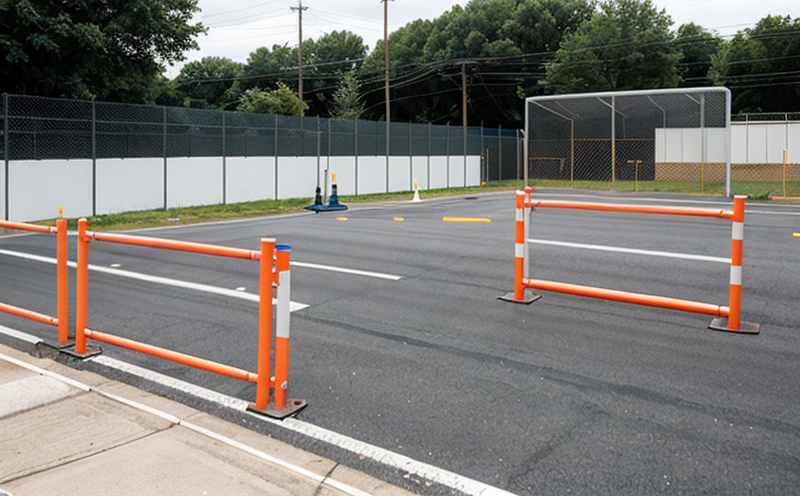EN 13087 Face Shield Penetration Resistance Testing
The European Standard EN 13087 specifies the requirements and methods for testing the penetration resistance of face shields. This standard is crucial in ensuring that personal protective equipment (PPE) meets the necessary safety standards, protecting workers from hazards such as dust, debris, and other airborne contaminants. The standard applies to various types of face shields used in industries where there is a risk of eye or facial injury.
The testing procedure outlined in EN 13087 involves simulating environmental conditions that could potentially compromise the integrity of the face shield. This includes exposure to dust, aerosols, and other particles under controlled laboratory conditions. The test evaluates the ability of the face shield to resist penetration by these contaminants while maintaining its structural integrity.
The testing process typically begins with selecting a representative sample of the face shield. This sample is then subjected to various challenges designed to replicate real-world scenarios where the face shield might be exposed to harmful particles. These challenges include exposure to a specific concentration and size range of particles, which are delivered at defined velocities using specialized equipment.
The testing apparatus used in this procedure includes a dust chamber or aerosol generator that can create an environment with controlled levels of particulate matter. The face shield is positioned in the chamber such that it faces the particle source. The test then proceeds by introducing particles into the chamber, and the apparatus measures how many particles successfully penetrate through the face shield.
The results are analyzed to determine if the face shield meets the specified criteria for penetration resistance. If a certain percentage of particles succeed in penetrating the face shield, it fails the test according to EN 13087. Compliance with this standard ensures that workers can rely on their PPE to provide adequate protection against airborne hazards.
Understanding and adhering to the requirements set by EN 13087 is essential for manufacturers of protective equipment as well as quality managers responsible for ensuring product compliance. By following these rigorous testing procedures, industries can enhance worker safety while maintaining operational efficiency.
Applied Standards
The European Standard EN 13087 is widely recognized and implemented across various sectors that rely on protective equipment for occupational safety. This standard ensures consistency in the testing methodology, making it easier to compare results between different manufacturers and products.
- EN 13087: European Standard specifying requirements and methods for face shield penetration resistance.
- ISO/IEC 17025: International standard that sets criteria for competence of testing laboratories.
- ASTM F1964: American equivalent to EN 13087, detailing standards for head protection.
The implementation of these standards helps in maintaining high safety levels across all relevant industries. By adhering to such international standards, manufacturers and laboratories ensure that their products meet the highest quality benchmarks, thereby protecting workers effectively.
Industry Applications
- Construction Industry: Workers in construction sites are often exposed to dust and debris. Testing face shields according to EN 13087 ensures that they provide adequate protection against airborne contaminants.
- Hospitality Sector: Staff working in kitchens or other areas where there is a risk of splashing food particles may benefit from protective face shields that meet the standard for penetration resistance.
- Manufacturing Plants: Employees engaged in processes involving chemicals or powders require face shields that can withstand exposure to airborne hazards without compromising worker safety.
- Cleaning Services: Cleaning staff often encounter various types of particles and contaminants. Using face shields tested to EN 13087 enhances their protection against these risks.
These applications demonstrate the versatility and importance of adhering to standards like EN 13087 in ensuring occupational safety across different industries. By complying with such stringent testing protocols, manufacturers can deliver products that not only meet but exceed expectations for worker safety and comfort.
Customer Impact and Satisfaction
Implementing EN 13087 face shield penetration resistance testing has a significant impact on customer satisfaction within the occupational safety sector. Compliance with this standard ensures that customers receive high-quality protective equipment designed to meet strict safety standards.
For quality managers, adhering to these tests helps in maintaining product consistency and reliability, which is crucial for building trust among end-users. This consistency translates into higher levels of customer satisfaction as it guarantees that the face shields will perform reliably under challenging conditions.
Compliance officers play a vital role in ensuring that all aspects of production align with regulatory requirements. By incorporating EN 13087 testing procedures, they can demonstrate their commitment to safety and quality, thereby enhancing their reputation within the industry.
R&D engineers responsible for developing new products benefit from rigorous testing protocols as well. These tests provide valuable feedback on product performance, helping them make improvements where necessary. Such continuous improvement leads to enhanced product offerings that better meet customer needs.
Procurement teams also reap benefits from this standardization process. By specifying EN 13087 compliance in their purchasing specifications, they ensure that only high-quality suppliers are chosen for supplying protective equipment. This approach helps in maintaining the integrity of supply chains and ultimately contributes to overall customer satisfaction.





